The iPad Air Review
by Anand Lal Shimpi on October 29, 2013 9:00 PM ESTiPhone to iPad: CPU Changes
Although the iPad Air uses the same A7 from the iPhone 5s (and M7 motion coprocessor), there are a few minor differences that do lead to better performance.
At a high level we’re still talking about two 64-bit Apple Cyclone cores with 128KB L1s (64KB I$ + 64KB D$) per core, a shared 1MB L2 cache and a 4MB L3 cache that services the entire SoC. Apple increased CPU frequency from 1.3GHz to 1.4GHz in the iPad Air, a mild increase but in line with what we’ve seen from previous iPad designs. That’s the first impact on performance - a 7.69% increase in CPU frequency.
The second impact on performance is something I only noticed while digging around under the hood of the A7. It seems like the implementation in the iPad Air can, for whatever reason, hold more instructions in flight (over 20% more) than the A7 in the iPhone 5s. It’s unclear to me whether the A7 in the iPad is configured any differently via firmware/microcode or if perhaps we’re looking at a slightly different revision of the core, but the delta was repeatable in my testing.
The third, and likely biggest change impacting the iPad Air’s implementation of the A7 is the additional thermal headroom afforded by the larger chassis. I’m not going to go into details on exactly what this next test does (unfortunately we’re going to occlude some of the low level work that we do in light of all of the benchmark cheating going on), but we’re looking at a curve of performance vs. time for a particularly power heavy mix of code. We’re running the same exact code on both the iPad Air and iPhone 5s here, the only real difference is the size of the chassis:
You can see the 5s throttles back its CPU frequency to about 1GHz after the 2 minute mark. The crazy thing is that until that point the 5s manages to run at full frequency without so much as a hiccup for two full minutes, running an incredibly power hungry task. Given that most iOS apps aren’t this power intensive for such a sustained period of time, iPhone 5s users should almost always see the A7 running at a full 1.3GHz. Pretty crazy.
The iPad Air by comparison shows much more controlled behavior. Early on in the test we see a 7.7% performance advantage, which lines up perfectly with the iPad Air’s 7.7% CPU frequency advantage. By the end of the test the iPhone 5s has throttled to 900MHz, while the iPad Air drops to around 1.2GHz. At this point the iPad Air’s performance advantage grows to almost 40%.
CPU Performance
I've gone through our standard set of cross-platform browser based benchmarks to place the iPad Air's performance in perspective. As I mentioned in our 5s review, I don't know that there are many (any?) applications on iOS 7 that can really take advantage of all the A7 has to offer. There's definitely a ton of headroom left in the design. What's particularly exciting is when the A7 ends up in n-1 or n-2 iOS devices and it becomes the minimum developer target going forward.
I won't go through all of the results here again, but it's safe to say that the iPad Air is the fastest ARM based tablet on the planet at this point.
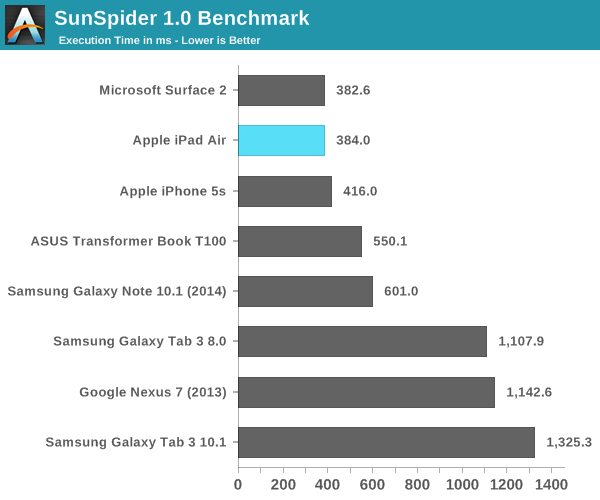
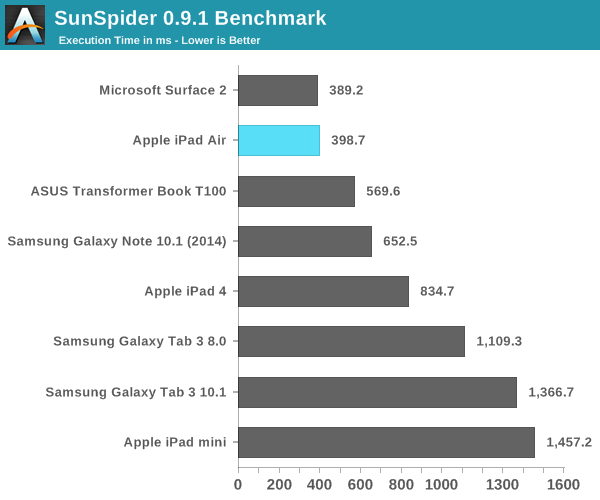
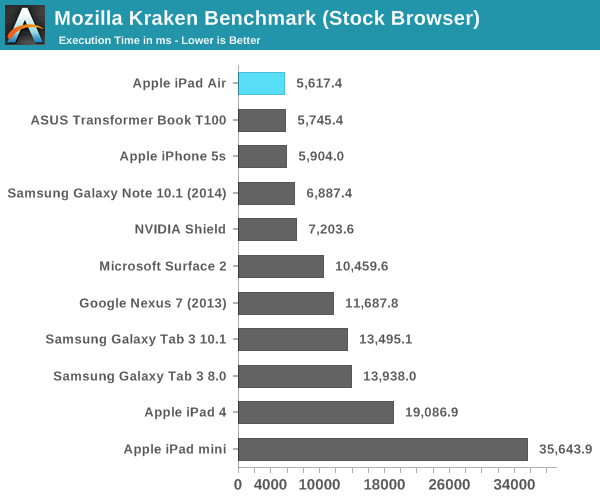
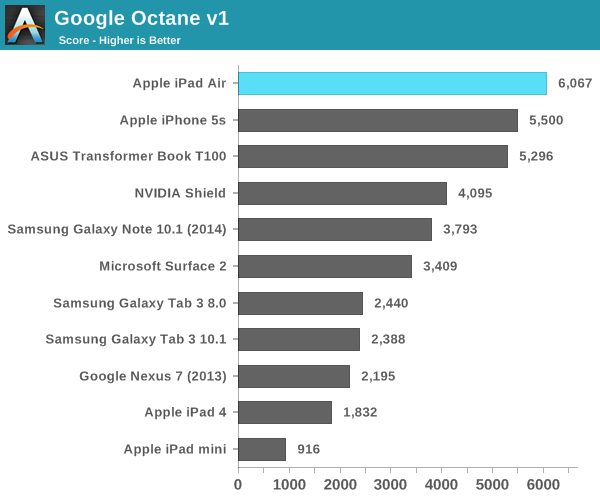
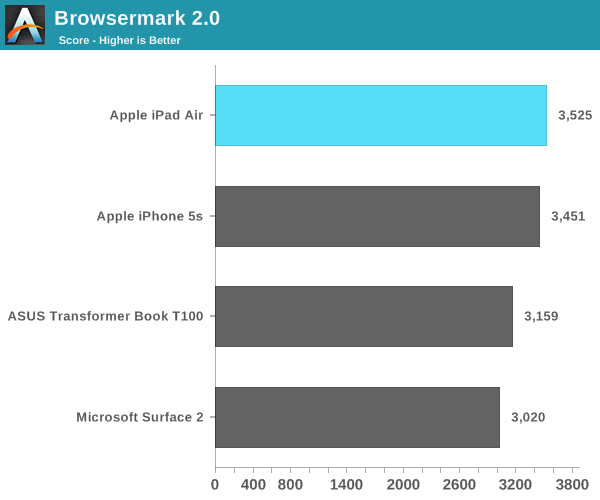
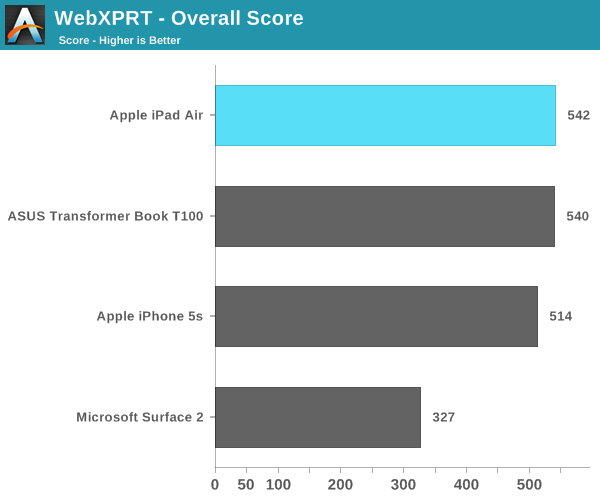
A7 Power Consumption
I’ll get to battery life in a bit, but I’ve been curious about the dynamic range of power consumption offered by Apple’s new A7 SoC. On the one hand we’re dealing with a lower power process (28nm vs. 32nm), but on the other hand Apple’s Cyclone cores can clearly draw more power given how beefy the architecture is this round. Apple frowns upon review sample dissection so I had to turn to a less scientific method of external platform level power measurement. The fidelity of the numbers here aren’t all that great but it’s better than nothing.
For the first test I measured platform power consumption during a Kraken run:
I purposely started measuring before the benchmark so I could get an idea of idle power consumption. The iPad Air consumes roughly 72% of the idle power as the iPad 4, both running at the same brightness. Here we’re not just seeing the A7’s advantages but also things like lower display power.
Focusing on the load portion of the measurement we see that both the new iPad and old iPad consume the same total power in this test. I suspect the A7 is drawing more power than the A6X, but it’s masked by a lower power display. Given how much faster the iPad Air is, Apple’s latest tablet features far lower overall task energy than the outgoing iPad 4. This is probably both the best case scenario for the iPad Air and the most likely case as well.
For kicks I wanted to see just how much power I could get the iPad Air to draw. Here I’m looking at platform power during our mini-power-virus test from above:
How’s that for dynamic range? Almost 12W running all out, but around half that in what we’d normally consider to be a stressful CPU test. I couldn’t get any actual applications/games on the iPad Air to behave like this so the results above are purely academic (for now). A quick run through GFXBench 2.7’s T-Rex HD test confirms that even pushing the GPU won’t hit these numbers. The max I saw running T-Rex offscreen was ~6W, and turning to an actual game (Infinity Blade 3) the iPad Air pulls less than 5W.


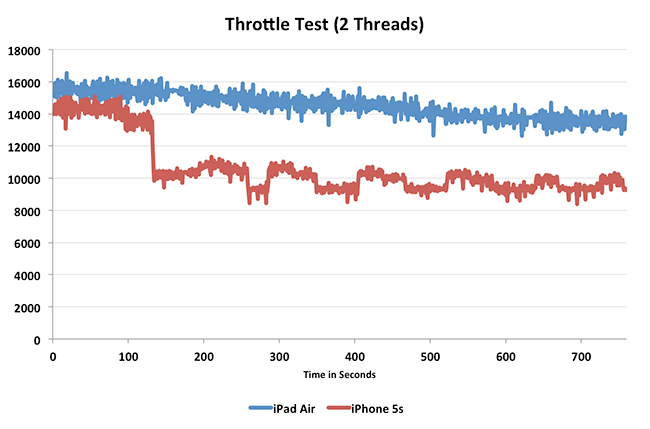
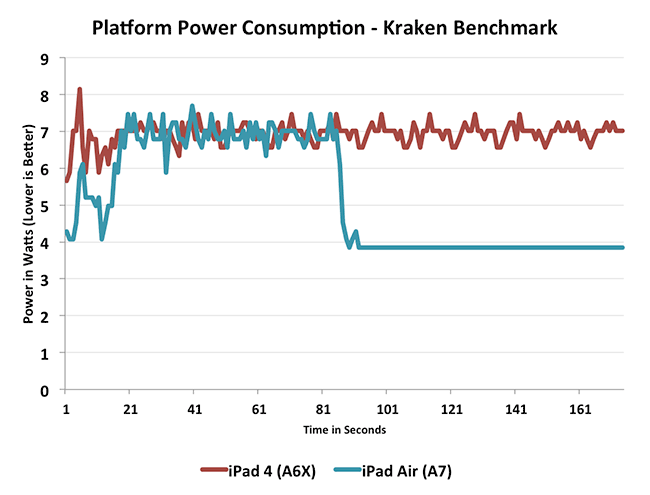
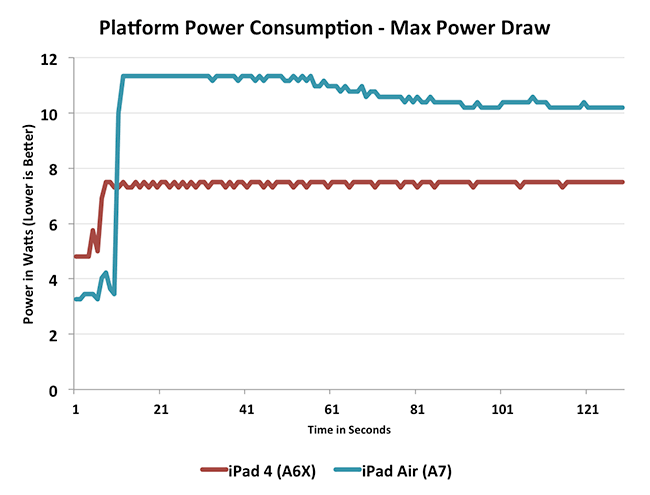








444 Comments
View All Comments
jelloboy - Saturday, November 2, 2013 - link
I've been coming here for many years. Their breakdown of products are fantastic, I always checkout what they have to say about something before picking it up.beggerking@yahoo.com - Saturday, November 2, 2013 - link
Where is the nexus 5 review? Why is it not up yet?golem - Sunday, November 3, 2013 - link
Why are you expecting one so soon? Most major outlets only have previews or first impressions and Anandtech's reviews usually come late anyway.jelloboy - Saturday, November 2, 2013 - link
I just got my Air today, I'm upgrading from an iPad 3 and it's actually quite impressive in your hand, much more so than I thought it would be. Very comfortable and light to hold but still feels like an Apple product (which is a good thing) - very fast and the biggest thing I was worried about isn't an issue. I was worried since they cut some width off the sides that you might run into an issue of not having anyplace to rest your thumbs - however this isn't an issue at all. Since the iPad Air is a good amount lighter you don't to use as much leverage - plus I guess the software has some sort of thumb reject stuff in it - regardless it works.Obviously the unit is much faster than the iPad 3 - just generally usage is much more enjoyable on the Air. The iPad 3 wasn't slow, but it certainly wasn't as fast as my iPhone 5 - the Air obviously doesn't have the issue.
So I wasn't sure if this new iPad would really be all that different, if the size and weight changes would be as dramatic as what I've read about here and other places - but I'm happy to say it really is quite an improvement.
Also Android fanboys before you start crying, so you know I have 4 Sony Google TVs (which I love), and Nvidia Shield (which is awesome) and I've owned 3 different Android tablets over the years (Transformer TF100, Nexus 7, Transformer TF300). For the record the Android tablets are awful, terrible - slow, crappy software, lots of bugs. Meanwhile the Shield, which thinks it's a phone, actually runs very well. Anyways my point is Android has a long long long long long long way to go to be competitive in the tablet market. A long way.
Gadgetmanjohn - Sunday, November 3, 2013 - link
I'm an Apple fan, I have an iPad 1 and 3 but skipped 4 as it came out too soon after I'd purchased the 3rd gen. However, having tried the iPad air in the shop I was completely put off by the sound vibrations through the chassis. You can feel it all the way from the bottom to the top, very off putting when watching video or playing music whilst holding it. I just can't believe more people aren't talking about it, let's hope the mini doesn't suffer the same problem.Origin64 - Monday, November 4, 2013 - link
You guys still pretending this is anything new? Same rectangle, different day.Chrispy_ - Monday, November 4, 2013 - link
No matter how good this device may be, I can't get over the fact that iOS7 is such a blatant copy for the visual style of Android. The default wallpaper on this reminds me of several of the 4.2 JellyBean wallpapers:http://www.smartkeitai.com/wp-content/uploads/2012...
http://www.smartkeitai.com/wp-content/uploads/2012...
Brakken - Thursday, November 14, 2013 - link
I was able to skin my android in iOS7 five months before iOS7 was released. Who's copying who now, huh? Huh?!nasqb112 - Monday, November 4, 2013 - link
Great review (as always) as this looks like an awesome device. I want to get an opinion from the Anandtech crowd:I currently have a MacBook Air (2011) and a Nexus 7 and want to consolidate.
I was thinking Surface Pro 2 or iPad Air with keyboard case (similar to the Surface keyboard blades) as I need to be productive on the device. I'd also watch movies, surf the web, game while traveling, etc.
Can anyone offer their thoughts on iWork vs Office (particularly for spreadsheets/data analysis and presentations?). I know what Office is supposedly coming to iPad, but I'll believe it when I see it.
So what would you choose, Surface Pro 2 or iPad Air with keyboard and why? Thanks all!
tripleverbosity - Wednesday, November 13, 2013 - link
If your biggest concern is running office I don't think the iPad Air with keyboard would be a good fit for you. Who knows when Office actually shows up for iOS and what level of functionality Microsoft will expose. As for iWork, it definitely isn't as comprehensive of an offering as Office at this point. That said, there's no way I'd buy a Surface Pro 2. If you can fit in into your budget, spend a couple hundred more and upgrade to the latest Macbook Air. It seems like you are trying to replace the laptop experience with a tablet/keyboard combo. Why not just go with a great laptop like the Air? You'll get better performance, better software capabilities, a superior keyboard and trackpad, and the best battery life out in the segment.